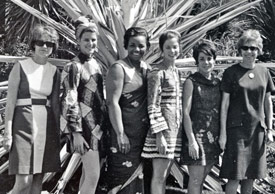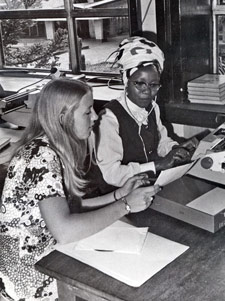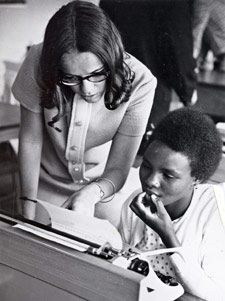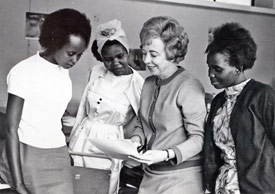Take Note: Colby-Sawyer's Kenya Connection

In the last year, Colby-Sawyer College has continued to strengthen its commitment to diversity through a growing international student population, the establishment of a Cultural Diversity committee, and the announcement of the Global Beginnings program, which will offer 60 first-year students the opportunity to study in France and Italy.
The college also welcomed its first Fulbright Scholar-in-Residence, Dr. Isaac Nyamongo, a medical anthropologist and an associate professor and director of the Institute of Anthropology, Gender and African Studies from the University of Nairobi in Kenya. This vigorous inclusion of multi-national perspectives is not, however, the first time that Colby-Sawyer has taken a strong interest in international relations, nor is it the first time that the college and the University of Nairobi in Kenya have shared a connection.
A Pioneering Partnership
Before coming to Colby Junior College as its president in 1962, Dr. Everett M. Woodman worked in various positions abroad including Cultural Affairs Officer in Madras, India, Attaché at the U.S. Embassy in New Delhi, and director of the Educational Exchange Program for India. As a result, when Woodman arrived in New London, he recognized the need for an international perspective on education. One of the most notable programs that resulted from his conviction was the partnership between Colby Junior College's Secretarial Science program and Operation Crossroads Africa.

Operation Crossroads Africa was established in 1958 by Dr. James H. Robinson. A forerunner to the Peace Corps, Crossroads Africa was established to allow young Americans and Africans to work together on a grassroots level. Collaboration between Colby Junior College and Crossroads Africa began in 1966 when President Woodman and Dr. Robinson met at a three-day convocation held at the college; during that time, they discussed the need for secretarial improvement in Africa. Recognizing that Colby Junior College had a strong Secretarial Science program, President Woodman recommended a partnership between the college and Crossroads Africa.
From New London to Nairobi
A four-part plan was established with the objectives to upgrade secretarial standards and procedures in Africa, to establish a secretarial training program for Africans, and to produce qualified African secretaries in East Africa for service in business, commerce, industry and government. In 1967, Phase One began when the Secretarial Science department head, Marnie Kurtz, and Colby Junior College student, Lindy Fisher, conducted a survey of secretarial work in Kenya and Tanzania. They spent six weeks in Nairobi and two weeks in Dar es Salaam visiting seven secretarial schools that had a combined enrollment of 790 students.
Kurtz and Fisher were surprised to discover that of these 790 students, only 200 were African. Additional findings revealed that the majority of personal secretaries working in both the Kenyan government and the private sector were Asian or European due to the lack of secretarial skills and English language skills in African secretaries.

Kurtz and Fisher reported their findings to both Colby Junior College and Crossroads Africa, and a pilot project was implemented in the summer of 1968. Two Colby Junior College faculty members (including Kurtz), six students and an ESL teacher established an eight-week course at the University of Nairobi in Kenya. The course, Secretarial Improvement Course for African Office Employees, was available to anyone with at least six months of office experience. Twenty-four women were accepted the first year, but response to the program was so popular that applications were held over for the following year.
In 1969, the program was continued with the addition of a Typing Refresher Course for 25 students selected by the Ministry of Labor's office. The program would run until 1973, when the final two phases of the project were completed. By that time, several of the African students had come to Colby Junior College and other American secretarial science programs to take classes and returned to Kenya to teach their peers. Also, in that final year, an African-sponsored and run training program was established in Kenya. The Colby Junior College Secretarial Science program had completed its mission and left Kenya confident that their students now had all the tools they needed to teach future generations of secretaries.
Some Things Never Change: “I'll be okay, Mom”
This program was certainly a learning experience for the Colby Junior College students, most of whom had never been to Africa and didn't know what to expect. Many of their parents wrote concerned letters to the school about their children's safety in Kenya, but all of these fears were quickly removed by Marnie Kurtz, who oversaw the project during its entirety.
The students stayed in hotels in Nairobi and served as teacher's aides to the two faculty members. They assisted students in classes on shorthand, transcription, typing, grooming practices, job etiquette, and interviewing skills. In addition to the work these women did in the classroom, the Colby Junior College students were able to experience African culture.
One student, Marian Fernandes, shares, “We had a very busy night life. We dated all types of people: Africans, Asians, Europeans, Americans and Canadians. Each introduced us to a new facet of their environment and explained their different customs and beliefs” (Colby Courier, 10/8/1968). In addition to their nighttime activities, the students spent their weekends on safari or exploring tribal cultures on planned trips around the countryside.

The experience was an eye-opener for the Colby Junior College students. When asked about living in Nairobi and how it differed from an American city, one student responded, “I found adjusting to Nairobi difficult, [but] the longer I was there, the easier it became. The whole city is a completely different culture—being a minority in a black country is really strange,” (Evaluation, Crossroads Africa, RG 23.10.1, Colby-Sawyer College; Cleveland Colby Colgate Archives; New London, N.H.). Other responses included that it was friendly, warm, slower paced, and that there was a lack of modern conveniences. All agreed when they returned that Crossroads Africa was a positive experience and one of the best of their lives.
To learn more about the Crossroads Africa project undertaken here at Colby-Sawyer College or President Woodman, please contact the Cleveland Colby Colgate Archives; learn more about Operation Crossroads Africa, which is celebrating more than 50 years of service and friendship with Africa, here.


